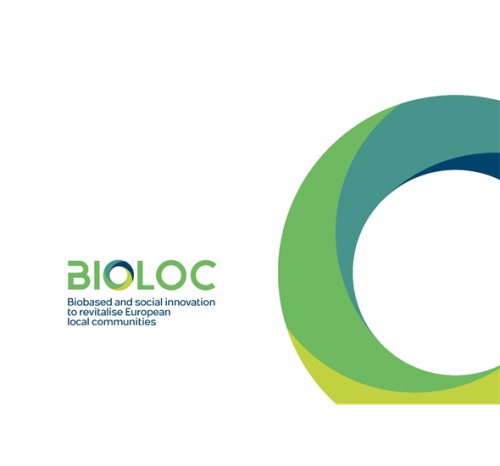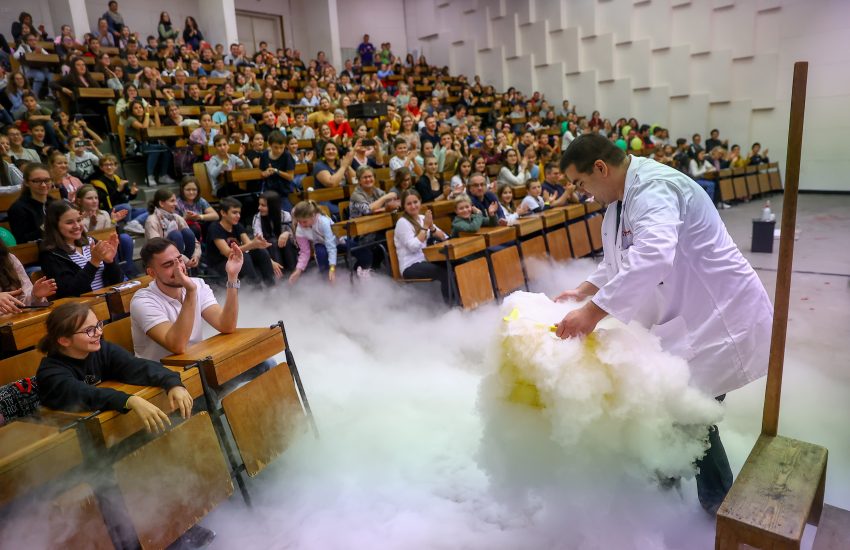Policy Stakeholders Conference on EU-EaP STI cooperation in addressing Health, Budapest, Hungary on 19-20 April 2016
The third Policy Stakeholders Conference (PSC) organised by the IncoNet EaP project took place in Budapest at Danubius Hotel Gellért on 19-20 April 2016. The conference addressed ‘Health’ as a focus area of EU-Eastern Partnership Cooperation in Science, Technology and Innovation. The main aim of the Policy Stakeholders Conferences was to bring together policy makers, representatives of the research community and the private sector to address specific problems that countries in the region face and that are of mutual interest and benefit.
The “STI International Cooperation Network for Eastern Partnership countries – IncoNet EaP” project is dedicated to the promotion of the bi-regional policy dialogue in Science, Technology and Innovation between the EU Member States (and Associated countries) and the Eastern Partnership (EaP) countries, aiming at the identification of priorities for action especially in the three Societal Challenges of particular importance for EU and EaP, namely Climate Change, Energy and Health.
The Conference was organised by the Centre for Regional and International STI Studies and Support (CeRISS), Athens, Greece in cooperation with the Regional Centre for Information and Scientific Development (RCISD), Budapest, Hungary.
The Conference provided the opportunity for an in-depth exchange of views among high-level policymakers, representatives of the research communities in the EU/MS AC and the 6 EaP countries, as well as other key stakeholders active in the region on regional and international policies, research programmes and projects addressing Health. The aim of the Conference was to take stock and showcase best practices regarding EU-EaP scientific cooperation, discuss concrete innovation cooperation projects, and promote international collaboration, networking, matchmaking. In addition the Conference provided the opportunity to present a good number of projects from the region as well as best practice examples with the aim to create synergies among stakeholders for future cooperation activities in H2020 and beyond.
The conference gathered 87 policy makers and representatives of the academic and scientific communities. They represented 65 organisations from 14 European and Eastern Partnership countries: Armenia, Austria, Azerbaijan, Belarus, France, Georgia, Germany, Greece, Hungary, Italy, Moldova, Poland, Sweden and Ukraine. A number of international organisations (Amsterdam Institute for Global Health and Development (AIGHD), Institute Pasteur, Northern Dimension Partnership in Public Health and Social Well-being (NDPHS), Stop TB Partnership, World Health Organization), as well as a representative from the European Commission attended to the event. Participants represented also public policy coordination bodies in the field of research, innovation, health and international STI cooperation at national and EU level, major international projects and programs in the health sector as well as some organisations representing the civil society, the research community and the business. More than one third of the participants were women.
The welcome speeches were provided by Hungarian Deputy State Secretary for EU and International Affairs of the Ministry of Human Capacities, Policy Officer of the European Commission Directorate General Research & Innovation and Managing Director of the Center for Regional and International Studies and the promotion of STI (CeRISS, Greece), the scientific coordinator of the IncoNet EaP project.
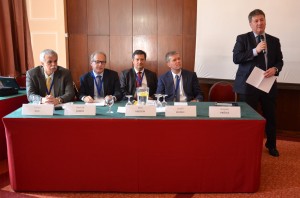
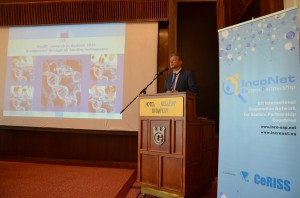
First day of the conference international organisations presented the current international strategies, initiatives and programmes operating in the EU member states, associated countries and in the Eastern Partnership region. Representatives (Director or Head of Department level) from the sectoral ministries or institutes dealing with health research from all EaP countries gave an overview of state of affairs of national policies on health research and innovation in their countries. The second part of the Conference was devoted to discuss the challenges of innovation activity in the EaP countries and the promising areas of cooperation with the European Union. Several institutions and health related projects presented their initiatives, programmes and good practises on health research and innovation during the conference, such as: BRIDGE Health, EIT Health, ERA-NET NEURON, JPIAMR and MOBI4Health. Second day of the conference the main challenges and tendencies in health related to R&I issues and international fields of potential cooperation were discussed in world cafe method conversations. During the discussions many recommendations were developed for a stronger EU-EaP collaboration in health research and innovation.
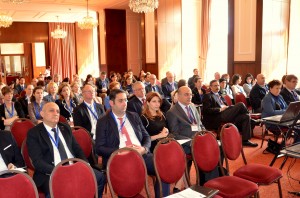
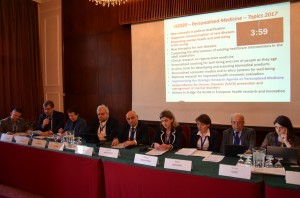
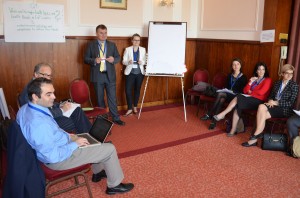
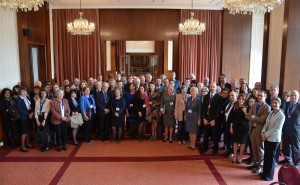
Report
The report of the conference will be available by summer 2016 containing the good practice examples, recommendations for a stronger EU-EaP STI cooperation in health research and innovation.
Previous Policy Stakeholders Conferences
This Policy Stakeholders Conference was the 3rd organised by the IncoNet EaP project. Learn more about the previous Policy Stakeholders Conferences:
EU-Eastern Partnership STI Policy Stakeholders’ Conference on Climate Change
Policy Stakeholders Conference ‘Energy Research and Innovation in the Eastern Partnership’
Downloads & more details
Presentations
OPENING SESSION
The EU Framework Programme for Health Research and Innovation in H2020– László Helmle
SESSION I: State of Affairs of Policies, Initiatives and Programmes on Health Research and Innovation
PANEL 1: International Policies, Initiatives, Programmes and Funding Mechanisms on Health Research and Innovation
1. H2020 Work Programme 2016-2017 on Health – Zygmunt Krasinski
2. European Commission’s Scientific Panel for Health: together for better health and wellbeing for all – Ildikó Horváth
3. Innovation and Research – the 2 ingredients to END Tuberculosis – Suvanand Sahu
4. What perspective for European funding in Pasteur Institute’s business model? – David Itier
5. A look into current and future trends in national policies for eHealth and Innovation in the WHO European Region– Clayton Hamilton
PANEL 2: State of Affairs of National Policies on Health Research and Innovation in EaP countries
1. From research to Policy Development – Alexandr Bazarchyan
2. National research programmes and their health policy applications in Azerbaijan – Nabil Seyidov
3. Health researches and innovations in the Republic of Belarus – Alena Chumakova
4. R. Lugar Center for Public Health Research – Unique opportunity for research and innovation on health in Georgia – Ketevan Zaridze
5. Research and innovation of the field of public health in Republic of Moldova – Valeriu Pantea
6. Primary health care reform in Ukraine: priorities and perspectives – Olga Vysotska
SESSION II: Best Practice Examples of Studies & Projects on Health Research involving the EaP countries, Opportunities of the European Union
1. Bibliometric Analysis of EU-EaP joint publications in health – Hanna Scheck
2. BRIDGE Health: Improving indicators for monitoring health system performance – Maria Hofmarcher-Holzhacker
3. The ERA-NET NEURON – Advancing Neuroscience in Europe and beyond – Sascha Helduser
4. Boosting R&I Potential in Life Sciences at the University of Gdańsk, Poland – Tools, Synergies, Perspectives – Krzysztof Bielawski
5. EIT Health: A powerful alliance for healthy living and active ageing – Balázs Fürjes
6. The Joint Programming Initiative on Antimicrobial Resistance: from national plans to joint calls and capacity programmes – Laura Marin
CLOSING SESSION
1. Results from Session I Panel 1 – Béla Kardon
2. Results from Session I Panel 2 – Anastasia Vlyzioti
3. Results from Session II – Olga Meerovskaya
4. Results from Session III Panel 1– Yannis Kechagiaras
Contact
Ildikó Dorogi
Regional Centre for Information and Scientific Development, RCISD
Huvösvölgyi út 54. V./1
H-1021 Budapest | Hungary
E-mail: ildiko.dorogi@rcisd.eu


